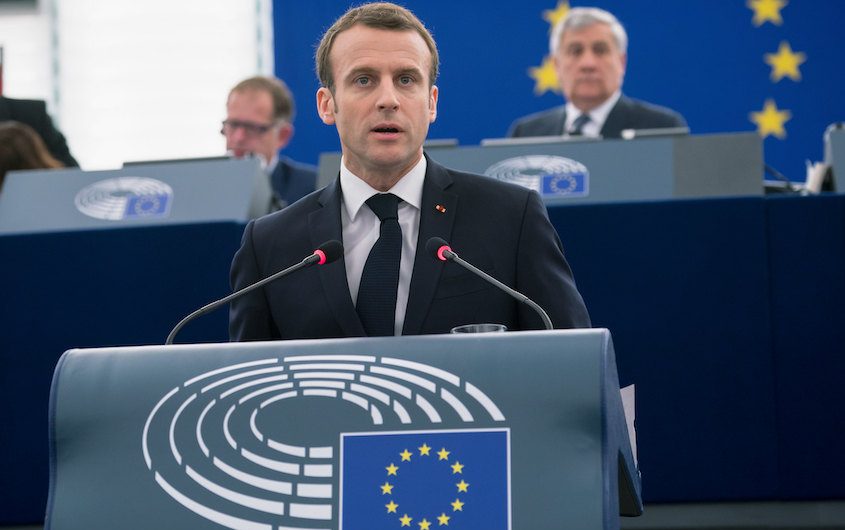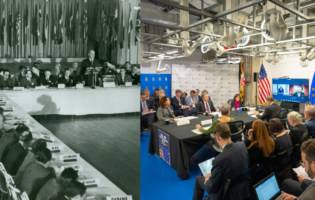
European Parliament via Flickr
Will France Lead the EU to More “Autonomy”?

Peter S. Rashish
Vice President; Director, Geoeconomics Program
Peter S. Rashish, who counts over 25 years of experience counseling corporations, think tanks, foundations, and international organizations on transatlantic trade and economic strategy, is Vice President and Director of the Geoeconomics Program at AICGS. He also writes The Wider Atlantic blog.
Mr. Rashish has served as Vice President for Europe and Eurasia at the U.S. Chamber of Commerce, where he spearheaded the Chamber’s advocacy ahead of the launch of the Transatlantic Trade and Investment Partnership. Previously, Mr. Rashish was a Senior Advisor for Europe at McLarty Associates, and has held positions as Executive Vice President of the European Institute, on the Paris-based staff of the International Energy Agency, and as a consultant to the World Bank, the German Marshall Fund of the United States, the Atlantic Council, the Bertelsmann Foundation, and the United Nations Conference on Trade and Development.
Mr. Rashish has testified on the euro zone and U.S.-European economic relations before the House Financial Services Subcommittee on International Monetary Policy and Trade and the House Foreign Affairs Subcommittee on Europe and Eurasia and has advised three U.S. presidential campaigns. He is a member of the Board of Directors of the Jean Monnet Institute in Paris and a Senior Advisor to the European Policy Centre in Brussels. His commentaries have been published in The New York Times, the Financial Times, The Wall Street Journal, Foreign Policy, and The National Interest, and he has appeared on PBS, CNBC, CNN, and NPR.
He earned a BA from Harvard College and an M.Phil. in international relations from Oxford University. He speaks French, German, Italian, and Spanish.
__
To mark the start of France’s six-month presidency of the European Union, President Emmanuel Macron and European Commission President Ursula von der Leyen honored two French citizens at a January 7 event at the Pantheon who made historic contributions to European integration: Simone Veil, a Holocaust survivor who was the first directly elected President of the European Parliament; and Jean Monnet, who inspired and became the first President of the European Coal and Steel Community that laid the basis for today’s 27-member European Union.
Macron’s message was clear. France, which has made “Recovery, Strength and a Sense of Belonging” the theme of its EU presidency, has traditionally played a leading role in determining Europe’s future and that will not change under his watch. Yet the stakes are high for Macron, who not only faces a presidential election in April but also a new government in Germany, the EU’s largest economy and France’s key partner for advancing its agenda.
At a press conference that followed the ceremony, Macron highlighted four key areas of engagement for the French presidency: climate, the digital economy, social and economic justice, and border security. But from the perspective of Europe’s role in the global economy, what stood out in Macron’s exposition of his country’s presidency agenda was his preview of an informal summit scheduled for March 10-11 in Paris. Calling it a “key element for the coming decade,” the French president wants this meeting to be the occasion for a “strategic discussion about our macroeconomic model and our new governance,” the “strategy of construction of the European…model of growth, investment, production, autonomy.”
“The French government has been a strong proponent of a number of recent European Commission proposals that are aimed at countering actions by third countries that can constrain the EU’s ability to foster its economic governance according to certain values.”
The two operative words here are “governance” and “autonomy.” The French government has been a strong proponent of a number of recent European Commission proposals on subsidies, procurement, and economic coercion that are aimed at countering actions by third countries that can constrain the EU’s ability to foster its economic “governance” according to certain values like protection of its single market, the climate, and human rights in a way that enhances prosperity. China’s state capitalism was the main motivation for these initiatives, but the trade and economic policies of the previous U.S. administration played a part as well.
While none of these measures are “unilateral” in the U.S. sense of the term, which connotes a possible violation of global trade rules, they are “autonomous” in that they provide the EU with avenues for asserting its economic interests when the World Trade Organization’s rules are either insufficient (there have been no new negotiations for more than 25 years) or inoperable (because the Trump administration’s blockage of the functioning of the WTO’s dispute settlement system remains in effect).
On the face of it, this emphasis on enhancing the EU’s freedom of action within the global economy should resonate with the new government in Germany led by Social Democratic Chancellor Olaf Scholz, who during his first visit abroad to Paris in December endorsed the idea of European “strategic sovereignty.” Compared to the previous government led by Angela Merkel, the current coalition, which also includes the Greens and the Free Democrats, seems less inclined to lean into engagement (e.g., with China) to assert Germany’s economic interests and more willing to embrace Macron’s ambition to create leverage that can deter threats to those same interests.
But if Macron’s plans for economic governance also include granting additional financial powers to the European Union along the lines of last year’s NextGen EU recovery plan, that could lead to tensions with Berlin, where the new government appears more restrained in its ambitions in this area.







